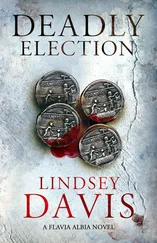He still felt too hungover to move. He just thought about it. Staying put was the way to get killed. Nonius ought to evacuate. Still, he told himself that being out in the open was dangerous too. This particular house had survived in the past. It was shored up, with walls and ceilings patched, but the fresco painter, who knew about building stability, had once said it only needed maintenance; he reckoned it looked safe for the time being.
Nonius must have slept through some upheaval. The noise seemed to have ceased now, yet he guessed what had been happening. Sod it. If it was midday, he had not yet rested long enough to want to rouse himself. Last night’s girl had gone. She had raided his purse, damn her; with one eye, he could see it lying on the floor, obviously empty. If he went out he would only get a bite to eat if he cadged off some old acquaintance, and most of them were wise to him.
So Nonius stayed where he was, prone on the bed, not troubling himself to go outside.
So far, he had no idea that this time everything was different.
Next the painter, who regards himself as a less raffish character. However, he has had his moments.
The painter witnessed what happened. He had left the room where he was about to start once the plaster was ready, and walked outside. The tremors of the past few days had unsettled him. Though he pretended to ignore his tension, the recent subterranean activity had been growing worse.
‘Come and see!’ his daughter had called from the street doorway, sounding more curious than alarmed, yet excited. ‘Father, look at this!’
He had been standing back from the main wall of the big room, taking the measure of its central panel where he was ready to paint a mythological scene. The new top coat of plaster was just reaching its critical stage. Even so, he went to find out what she wanted, after first encouraging his junior, Pyris, who was putting a black wash on a panel. It was well within the boy’s competence, so the painter could leave him to it.
Hylus, the other man in their team, was crouched down by the dado touching up a merry scene of cupids racing in chariots drawn by little goats. ‘Fresco cupids have a bloody hard life. I hope this bunch are grateful I’m letting them be boy racers. They’re constantly at it, working their wings off, making perfumes, weaving at looms, being goldsmiths. I bet their pay stinks too,’ joked Hylus, who often wittered on while he was working.
‘One’s got a boil on his bum,’ commented a plasterer. He was up on the scaffold, annoyingly. That ought to have been done by now, way back when the coffered ceiling and coves were put up and painted. They were supposed to finish first so the decorators could move top-down. Anyone other than a crack-brained plasterer would see that was the sensible way to programme a job.
‘Shit, it’s a drip; thanks, Three Coats. Fetch me a rag, will you, Pyris?’ Hylus was clearly thinking only a plasterer would make such a big deal of pointing it out. Three Coats, named for his endless lessons on how to build a fine surface, smirked. A sound wall in fact had six coats, three in the rough and three smooth with marble dust, but the painters, who were competent plasterers themselves, never let him finish telling them.
That smirk from Three Coats had irritated the painter more than usual, so it had been a good idea to move away. Popping out to see what his daughter wanted avoided snapping at the other man. As team leader, he liked to keep the peace.
He could not afford to disappear for long. Frescos must be painted at the right moment. Now that Three Coats had filled in his panel and its design was roughly marked out, he had to work fast, before the wet plaster went off. In fresco, colours were not simply laid on the surface but were sucked into the glossy final layer of the finish while it remained moist. This made the paint survive household knocks better, and it could be washed down without losing colour. They always assured their customers it would last forever.
Sometimes they completed details dry, but that was for a reason, or so they claimed. Actually they might not have finished in time and had no wet cloths to keep the plaster workable. They pretended to be using a ‘specialist technique’. Painters knew how to preserve their mystique.
The recent shudders from deep within the earth had disturbed and annoyed the team leader. He possessed a sense of danger, though he could live with risk. He just worried about their work. The current site had suffered before; next door, where they had also been working this month, the bakery oven had sustained major cracks in the big earthquake and was now being repaired yet again. Most of the flour mills were completely out of action. This morning, when he and his team turned up here, they had anxiously inspected all the walls; having to check every day for overnight disturbance made him depressed, even though everyone who worked in Pompeii routinely endured their work being damaged. At least the townsfolk tenaciously rebuilt; shockwaves meant a surge in property renovation, which was excellent, although you never knew if what you finished for your customer would survive the next upheaval.
An artist who cared could end up having a breakdown. At this point in the job, any flying dust was a nightmare. And what was the point of putting your soul into your work, if your efforts might be cracked apart or even brought down? If people liked your style they would call you back for repairs, but creating a scene for a second time was unsatisfactory. You could get tired of constantly redoing jobs. Artists dream that what they produce will last for generations – small hope in the Campanian earthquake zone.
Anyway, when customers had something done twice, even if the fault was unavoidable, there was always a niggle about the extra payment. He hated the stress.
So these past four days of tectonic agitation had left him restless. The uncertainty had made him surly and unable to paint well. He needed to settle before he started the new panel. As team leader, he did not need to ask anyone’s permission. He had moved away from his paints, as if to take a pee or find a bite to eat from his knapsack.
In reply to his young daughter’s call he stepped right outside the building. For a moment he stood quietly and looked up and down the side-street. It was being dug up in several places: there was already a long trench for what seemed like endless work to the water supply, god knows what engineer had thought that up. And now, next to the house, a cess-pit had been excavated, its ghastly contents piled up everywhere. That made the third in the sidestreet.
Householders would be glad if their indoor toilets stopped smelling, but they were not pleased about the haphazard dungheaps. This was even worse than normal. Pompeii’s streets could be foul. Sometimes a frustrated householder put up a sign on his exterior wall, saying Do not shit here, stranger, move on! It only gave passers-by ideas, and if it didn’t work for individuals, it was hardly going to deter the dead-eyed, cack-handed, bloody-minded workmen who carried out civic contracts, not when they had mounds of stupendously ponging sludge to store somewhere while they dug a big hole.
He stepped around the piles carefully and went in search of his daughter. She wasn’t to be seen on the main road, so he turned and cautiously retraced his path. He had to go right to the other end of the side street before he found her, standing stock still at a corner, balanced on a stepping stone. Unlike the more sedate town of Herculaneum where his wife lived, Pompeii had no proper drainage; the town sloped steeply down to the sea so when it rained, surface water just dashed along its streets towards the port, carrying every kind of rubbish. The stepping stones were handy, though a magnet to children. One more worry…
Читать дальше












